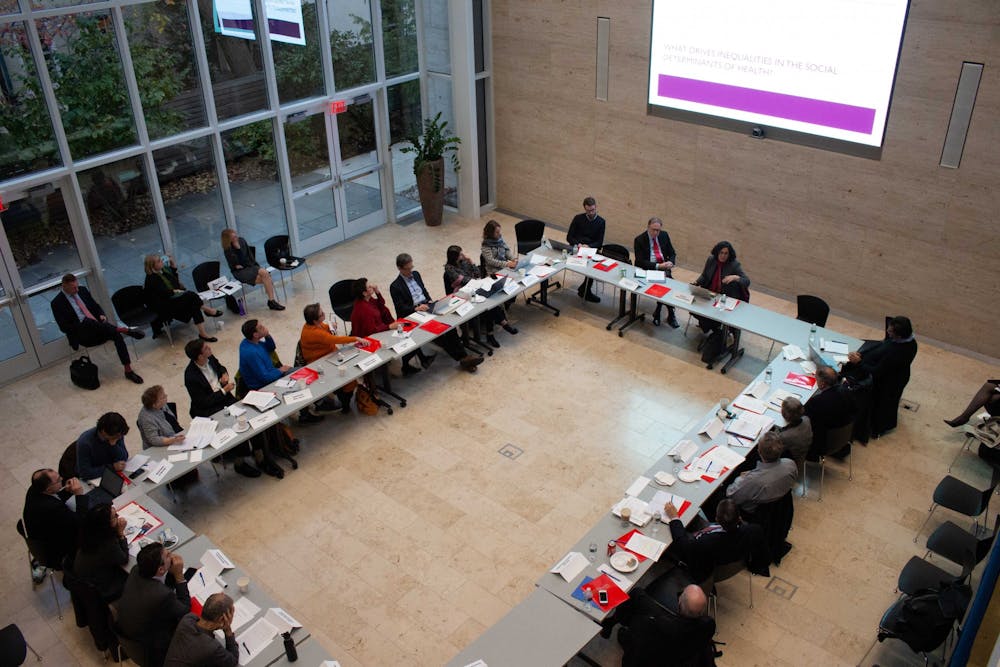A two-day conference hosted at Penn is bringing together academics and World Bank representatives to address policy issues facing Eastern Europe.
“Social Impacts of Post-Socialist Transition and Policies for the Future,” held Thursday and Friday, explores the histories and future policies of post-socialist Eastern Europe.
Featuring scholars and officials from a diverse array of fields, the workshop includes panels and speeches on topics, including "How Different Disciplines Address Transition" and "The Challenge of Demography, Migration, and Shrinking Populations." The final panel on Friday, titled “What Policies Are Needed Now," will feature Maurizio Bussolo, the lead economist in the World Bank's Chief Economist Office for Europe and Central Asia.
The workshop, which was timed to coincide with the 30th anniversary of the fall of the Berlin Wall, was organized by Russian and East European Studies professors Kristen Ghodsee and Mitchell Orenstein. While the event is closed to the general public, Ghodsee invited students from her freshman seminar, “Behind The Iron Curtain,” to attend.
“Pedagogically I just felt like it was very connected with the first-year seminar and gives them a taste of what it’s like to do scholarship in those fields at a much higher level,” Ghodsee said. “They [have] the opportunity to see what an expert-level discussion among scholars on this topic would look like.”

Attendees included economists, political scientists, anthropologists, and scholars from other fields. They were joined by representatives from the World Bank, an external host of the event.
Ghodsee said many of her students, who have been learning about everyday life in communist Eastern Europe during the 20th century, expressed interest in attending the conference. She said many speakers at the workshop, including Swarthmore College anthropology professor Maya Nadkarni and St. Louis University anthropology professor Bruce O’Neill, authored materials her students have read over the course of the semester.
"[This] gives them the opportunity as first-years to actually read a piece of scholarship and actually go and see the person who produced the scholarship and talk about the work they are doing," Ghodsee said.
The conference began Thursday with introductory panels and discussions chaired by Ghodsee, Orenstein and Penn Political Science professor Julia Gray. Each panel had a narrow theme that encouraged detailed discussion by scholars. Ghodsee said many of the scholars “were born in the region and had firsthand experience of these transitions.”
Attendees included economists, political scientists, anthropologists, and scholars from other fields. They were joined by representatives from the World Bank, an external host of the event.
“We have economists coming from the World Bank who are going to listen to what we have to say, and potentially make policy," Ghodsee said. "This is one of those cases where a conference can actually have a positive impact on the real world. This is an opportunity for us to take our research and apply it to policy-making in the region.”

College freshman Diellë Duga, who is in professor Kristin Ghodsee's class, said "The panel was so inclusive."
College freshman Victor Swezey, a student in Ghodsee's class who attended on Thursday, said the workshop is "extremely valuable to have," adding that it raised questions of “where the neoliberal West might have gone wrong and how those consequences are playing out right now.”
Swezey added that he was happy the conference included different perspectives, adding that each academic field has limitations, but together they give a more complete view.
"Anthropology is very human, while [economics] can be simplified into stats," he said. "Both have their limitations, [and] putting them together is valuable."
"The panel was so inclusive," agreed Diellë Duga, a College freshman from Kosovo who is in Ghodsee's class. "It involved research from different parts of the world, but mostly from Eastern Europe. People with different views can bring skepticism into each other’s points, to offer more inclusive knowledge."









